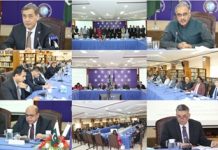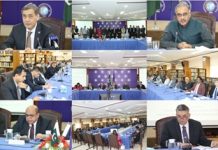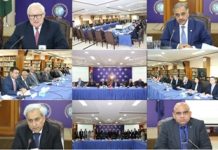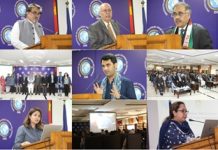It is beyond belief that the General who promised to the nation that he would bring all the corrupt politicians to justice is virtually on his knees begging support for anything they want in return
President General Pervez Musharraf’s thumping majority in the presidential elections through the electoral college is no surprise. He was expected to win and he has. The General (and soon to be constitutional President) and his supporters in the assemblies and outside have lauded his election as a major development towards a transition to a stable democratic political system and for the continuity of his policies. There is also an argument that Pakistan cannot perhaps win the war on terror or effectively support its allies, if Musharraf does not occupy a central position in the political system.
Most of the arguments supporting the view that Musharraf must continue as a civilian president for stability and continuity appear to be more apologetic than reflective of the true character of the constitution or norms of a normal democratic process. It is very hard to escape the feeling that institutions and constitutional norms don’t matter or they are marginally relevant, only the person or persons manipulating laws in their own favour do. The reasoning we have found through the political history of stage managing political processes is based on an ’emergency’ frame of mind. What it means is that the country is facing exceptionally painful domestic and foreign challenges and only the person who occupies a central place in the structure of power knows how best to handle them. We have heard this argument many times, and have seen so many times how the tide of time swept away such political geniuses to the dark pages of history.
On the surface, it seems that Musharraf has won yet another round against the political opposition. The opposition could not have halted the process without a stay order from the Supreme Court, which was not granted. Even if the opposition had brought large numbers of people to the streets, the formal electoral process could not be stopped short of a social revolution causing a major breakdown in the functioning of the government. Nothing of this sort has happened.
The resignations from the assemblies were more or less a protest move than a serious effort to cripple the Electoral College. Perhaps the dissolution of the NWFP Assembly could achieve that effect but the Musharraf camp deftly handled the issue by keeping the larger component of the MMA on its side by luring the famously ‘pragmatic’ Maulana Fazalur Rehman. The call of the opposition for a countrywide general strike also failed, as people did not turn out in the streets to protest.
Can we assume that the General and the political groups that he is realigning will be able to stabilise the system? Will the presidential election earn Pakistan and its ‘democracy’ any credibility inside and outside the country? Do we expect a smooth running of the new emerging coalition among the PMLQ, the PPP and the MQM?
The crass political manipulation that we have seen for the past eight years is hardly going to earn any democratic credentials for the political process. But democracy is a relative thing to most of the political players, and perhaps the last thing in the list of their ideals if they have any. To confirm this, look at the array of political groups from the PMLQ to now the PPP and how they have been keen in being co-opted into a system which from outside the power system they would term anything but democratic. The political past of those who are challenging the emerging political realignment is no different. Most of them also made similar choices to gain power under dubious constitutional arrangements. Pakistani politicians have their native understanding of the phrase ‘politics is the art of possibility’.
It is not without reason that the General sounds very upbeat and optimistic about his ‘second term’. He has got the PPP on board without losing the core of the PMLQ. He has unflinching support of the MQM that is more enthusiastic than any other group. So far, every political event has unfolded according to a well-designed plan. A part of that plan is that JUI faction, the largest chunk of legislators of MMA, has a kind of deal with the General, and the JUI might not be part of the opposition movement, if it ever takes off.
There is only one great hurdle that remains between the General and his new position as an elected civilian president of Pakistan: the final decision of the Supreme Court about his eligibility. We cannot really speculate over the decision. But already, the elections have greatly strengthened the moral position of the General. Without engaging in the merit of the case or the judgement, it would be difficult to dislodge the Chief of the Army Staff who has been elected as a president with a court decision. He will accept the decision of the Court, but clearly the political crisis in the country will further deepen with many uncertain possibilities that are making rounds in popular discussion.
Even if the Court’s decision validated Musharraf’s candidature, the political climate may remain uncertain. The opposition’s weakness in mobilising the masses can’t be interpreted as the General’s strength. There is a strange irony to the current political scenario. While the Electoral College has overwhelmingly voted for a general in uniform to be president for the next five years, he remains unpopular among the masses. The members of the assemblies comprising the Electoral College have not truly represented sentiments of the masses in electing Musharraf.
Therefore, two issues will continue to haunt Musharraf’s political future. First is the fact that he is no longer popular with masses as he was when he took over power. His popularity has continued to plummet with each action he has taken to buttress his political foundation, beginning from the suspension of the Chief Justice to the so-called National Reconciliation Ordinance. Among all the good things, he has lost credibility as a person and as leader. It is beyond belief that the General who promised to the nation that he would bring all the corrupt politicians to justice is virtually on his knees begging support for anything they want in return. He has got their support but has lost his image and the people’s trust.
Maybe it is not so unbelievable, because for the ruling groups it has been a normal political practice. And may be anyone of us will be too idealistic to raise ethical, moral and legal questions about political deals or manipulations.
In view of the fact that the masses are alienated from politics and the political class, the streets may not be filled with protestors, which bodes well for the new coalition of power groups. But relying on the weakness of the opposition is not a good political insurance policy. The system may hang between artificial stability, uncertainty and a threat of mass movement. The general elections during next couple of month may clear some of the fog, or push the country under a heavier layer of haze.
The author is a professor of Political Science at the Lahore University of Management Sciences.













